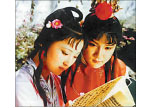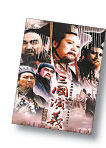Essential reading
Dream of the Red Chamber (Hong Lou Meng)

This novel details the lives of the wealthy Jia clan and includes more than 400 characters. It presents a complex picture of Chinese society as it charts the Jia family's fall from the height of their prestige.
The central character is a boy, Jia Baoyu, who was born with a mysterious piece of jade in his mouth. He is a sensitive and compassionate soul and spends all his time in the company of the teenage girls in his clan. His view is that "girls are in essence pure as water, and men are in essence muddled as mud". This book, published in the late 18th century, is often considered the zenith of classical Chinese fiction. Cao Xueqin wrote the first 80 chapters of this 120-chapter novel, while the last 40 chapters are widely acknowledged as written by Gao E.
Journey to the West (Xi You Ji)

Published in the late 16th century, during the Ming Dynasty (1368-1644), the tale by Wu Cheng'en is a fictionalized account of the Buddhist monk Xuanzang's pilgrimage to India. The monk's journey to obtain Buddhist religious texts, called sutras, occurs during the Tang Dynasty (AD 618-907). His three disciples are Monkey King, Pigsy and Sha Seng.
Monkey King is the most popular character in the novel. His child-like playfulness, his cunning mind and his boastful nature, coupled with his acrobatic skills, makes him a likeable hero among Chinese, old and young alike.
Romance of the Three Kingdoms (Sanguo Yanyi)

This action story is written between the late Yuan (1271-1368) and early Ming dynasties, and is attributed to Luo Guanzhong, who combined his knowledge of history with a gift for storytelling to create a rich tapestry of personalities.
This action story is based upon events in the turbulent years around the Three Kingdoms period (AD 220-280) when three warlords battled to win control of the country.
One of the book's greatest achievements is developing many complex and fascinating characters, among which King Liu Bei, statesman Zhuge Liang, and King Cao Cao are household names in China.
Outlaws of the Marsh (Shui Hu)

The novel is attributed to Shi Nai'an, who details the trials and tribulations of 108 rebels during the mid-Song Dynasty (AD 960-1279). It is widely believed to have been written during the late Yuan and early Ming dynasties.
The plot is vaguely based upon the historical bandit Song Jiang and his companions, who wanted to topple the government. The group was active in eastern China's Huaihe River region and eventually surrendered to government troops in 1119.
Like Romance of the Three Kingdoms, the novel is beloved for its brilliant story telling and distinctive characters.
China Daily
(China Daily 11/20/2007 page18)














